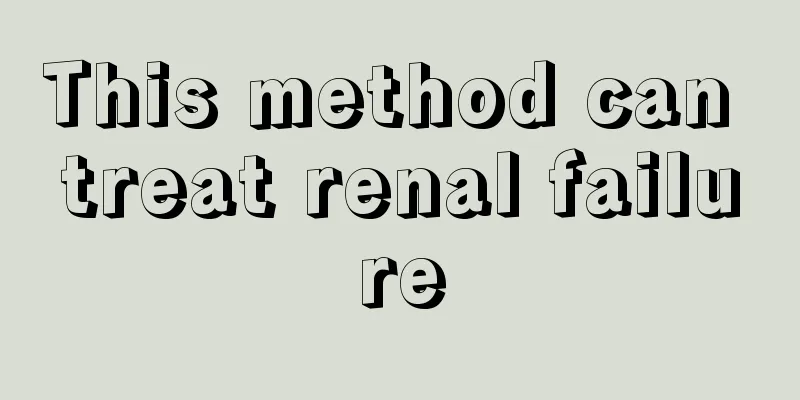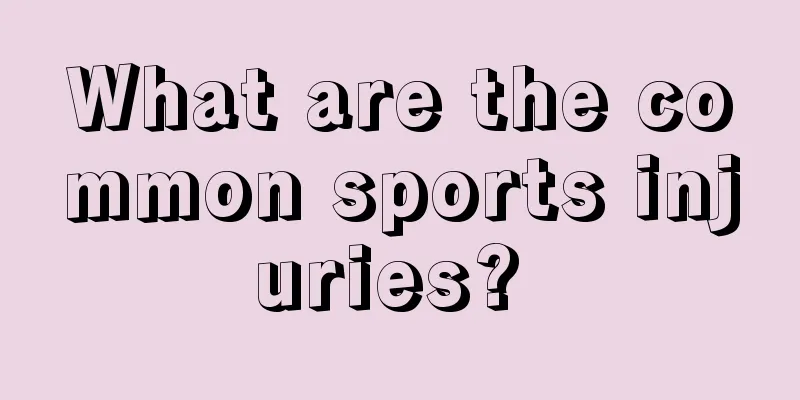This method can treat renal failure

|
Renal failure is a type of kidney disease caused by decreased kidney function or insufficient blood supply to the kidneys. Renal failure can easily lead to lesions and is very harmful to health. There are many ways to treat renal failure, which can be treated through dialysis or kidney transplantation. treat 1. Treatment of the cause To treat the cause of renal failure, such as insufficient blood supply or blood loss, the patient will be given fluid replacement and anti-infection treatment if there is an infection. 2. Kidney function Because the kidneys have lost their function, doctors will temporarily use dialysis (commonly known as dialysis) to help eliminate toxins and waste from the body. If patients with acute renal failure do not receive appropriate treatment or cannot control the disease, and the disease develops from acute to chronic renal failure, they will need lifelong dialysis due to uremia. Dialysis is the selective removal of certain substances from the blood through filtration. That is to say, the toxic waste, water and salt accumulated in the patient's body after renal failure are eliminated through artificial means, so that the patient's physical condition can be restored to a healthy state. There are two forms of dialysis currently used: hemodialysis and peritoneal dialysis. Hemodialysis uses a special machine to replace the functions of your kidneys. Peritoneal dialysis uses the body's peritoneum as a filter to remove toxins from the body. 3. Diet Diet control: For patients with renal failure, since their kidney function is damaged, the toxins and waste produced after food is eaten cannot be excreted normally. Therefore, they must pay special attention to their diet to avoid causing a burden on the body. 4. Kidney transplantation Some patients with end-stage renal failure require long-term dialysis treatment. If the patient's own conditions are suitable, kidney transplantation (kidney replacement) can bring patients a better quality of life; but kidney transplantation is a big project. Although current medical technology is quite good, a lot of prior evaluation is still needed to increase the chances of successful kidney transplantation. Kidney transplantation is the process of surgically transplanting a kidney from an organ donor into the recipient's body. Possible sources of kidneys: family members, spouses, close friends, or brain-dead people who have signed a consent form to donate their organs before their death. Of course, the best-matched kidney usually comes from a sibling of the recipient, since they have the greatest chance of genetic compatibility. Kidney transplantation is currently the best way to treat kidney failure, because the kidney transplanted into the patient's body can almost completely replace the function of the failed kidney, allowing the patient to live a normal life. Renal failure treatment treat Including the following aspects: ① Treatment is targeted at the cause, such as volume expansion to correct pre-renal factors and eliminate post-renal obstructive factors. Severe acute or other glomerulonephritis can be effectively treated with hormone shock. Allergic interstitial nephritis should immediately stop taking the medication and give anti-allergic drugs, etc. ② During the oliguria period, the principle of fluid intake is to keep the amount of fluid out as the amount of fluid in. ③Correct hyperkalemia and acidosis. ④ Start dialysis therapy as early as possible, which has the functions of dehydration, removal of toxins, correction of electrolyte imbalance and acid-base imbalance, and enables patients to overcome the difficulties of the oliguria period. During the polyuria period, water and electrolyte balance should be strictly monitored to prevent death from dehydration and electrolyte imbalance. During the recovery period, it is very important to pay attention to strengthening nutrition, rest and avoiding the use of nephrotoxic drugs. Chronic nephritis cured treat In the early stages of chronic glomerulonephritis, appropriate treatment should be given according to its pathological type to inhibit immune-mediated inflammation, inhibit cell proliferation, and reduce renal sclerosis. The main purpose should be to prevent or delay the progressive deterioration of renal function, improve or relieve clinical symptoms, and prevent and treat complications. The following combined treatment measures can be adopted: 1. Actively control high blood pressure Prevent renal function decline or improve already damaged renal function, prevent cardiovascular complications, and improve long-term prognosis. (1) Treatment principles ① Strive to reach the target value, such as urine protein (2) Treatment methods ① Non-drug treatment: Limit dietary sodium intake. Patients with hypertension should limit sodium intake and control sodium intake within 80-100 mmol. Antihypertensive drugs should be taken on the basis of a sodium-restricted diet: adjust dietary protein and potassium-containing food intake; quit smoking, limit alcohol consumption; lose weight; exercise appropriately, etc. ② Commonly used antihypertensive drugs in drug treatment include angiotensin converting enzyme inhibitors (ACEI), angiotensin II receptor antagonists (ARB), long-acting calcium channel blockers (CCB), diuretics, beta-blockers, etc. ACEI and ARB should be given priority because they not only lower blood pressure but also have a renal protective effect by reducing urine protein and delaying the deterioration of renal function. Patients with renal insufficiency should prevent hyperkalemia and elevated serum creatinine when using ACEI or ARB. When serum creatinine is greater than 264 μmol/L (3 mg/dl), they must be used with caution under close observation, paying special attention to monitoring renal function and preventing hyperkalemia. A small number of patients experience persistent dry cough as an adverse reaction when using ACEI and can switch to ARB. |
<<: What is the best treatment for hyperthyroidism? Hyperthyroidism can be treated like this
>>: What are the effects of urine therapy?
Recommend
How long can you live with advanced uterine cancer
In our lives, we often ignore our own health prob...
Right middle lobectomy
Right middle lobectomy is mainly performed based ...
TCM Syndrome Differentiation and Diet Therapy for Colon Cancer
In recent years, the incidence of colorectal canc...
People should always pay attention to the care methods of lymphoma
In recent years, the incidence of lymphoma has be...
Tips to quickly get rid of bad breath
Bad breath is something we often encounter in our...
Methods for treating fat granules
I believe everyone knows what fat granules are. F...
Back pain on cloudy and rainy days
Some people like rain, while others don’t. Those ...
How to peel walnut kernels?
Walnuts are a common food in real life. Walnuts a...
What are the factors that lead to the occurrence of cervical cancer?
Cervical cancer is a very common disease in life....
Introduction to the pros and cons of contact lenses
We all know that many young people have myopia pr...
Is esophageal cancer metastasis to the liver contagious?
Although esophageal cancer is a common and extrem...
What's wrong with my forehead being red
Our face is an important reflection of our physic...
Can antibodies be detected after injecting HPV vaccine?
In modern life, women's physical health is af...
Which material is better for water purifier filter
Water purifier is one of the most commonly used i...
What should I do if my hands always have cracks?
If your hands are always cracked, it means that t...









